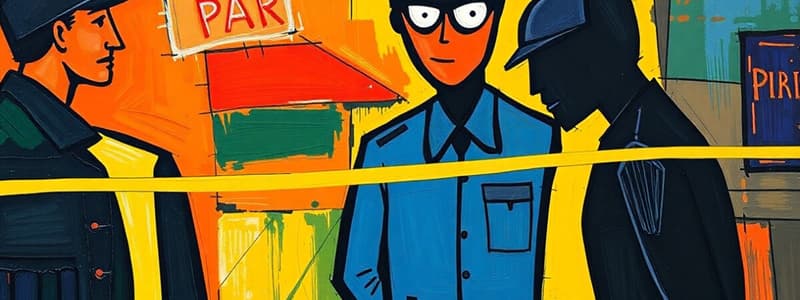Podcast
Questions and Answers
What is the primary purpose of the initial appearance in the criminal justice process?
What is the primary purpose of the initial appearance in the criminal justice process?
- To inform the suspect of their charges and rights (correct)
- To conduct the trial of the accused
- To determine the sentence of the accused
- To formally charge the suspect with a crime
Booking does not include photographing or fingerprinting the suspect.
Booking does not include photographing or fingerprinting the suspect.
False (B)
What does probable cause mean in the context of arrests?
What does probable cause mean in the context of arrests?
A reasonable belief that a crime has been committed and that the suspect committed it.
What does the term 'dark figure of crime' refer to?
What does the term 'dark figure of crime' refer to?
During the _______ hearing, the existence of probable cause is determined for a criminal case.
During the _______ hearing, the existence of probable cause is determined for a criminal case.
Most criminal prosecutions begin with law enforcement detecting a crime.
Most criminal prosecutions begin with law enforcement detecting a crime.
Match the following arrest processes with their descriptions:
Match the following arrest processes with their descriptions:
Which modern advancement has improved the accuracy and speed of the booking process?
Which modern advancement has improved the accuracy and speed of the booking process?
What legal standard must be met for an arrest to be considered legal?
What legal standard must be met for an arrest to be considered legal?
The decision to charge a suspect is purely based on personal opinion of the police officer.
The decision to charge a suspect is purely based on personal opinion of the police officer.
The _____ investigation involves securing the crime scene and identifying key individuals such as victims and witnesses.
The _____ investigation involves securing the crime scene and identifying key individuals such as victims and witnesses.
What can happen to a suspect's personal property during booking?
What can happen to a suspect's personal property during booking?
Match the following stages of the criminal justice process with their correct definitions:
Match the following stages of the criminal justice process with their correct definitions:
Defendants who cannot afford an attorney may be assigned a _______ who is compensated by the court.
Defendants who cannot afford an attorney may be assigned a _______ who is compensated by the court.
Which case established the requirement that police use of force must be objectively reasonable?
Which case established the requirement that police use of force must be objectively reasonable?
Most crimes are detected by random patrols of law enforcement officers.
Most crimes are detected by random patrols of law enforcement officers.
What happens after law enforcement completes the arrest process?
What happens after law enforcement completes the arrest process?
What is one key aspect of a follow-up investigation?
What is one key aspect of a follow-up investigation?
The use of _____ force by police is authorized when necessary to take a suspect into custody.
The use of _____ force by police is authorized when necessary to take a suspect into custody.
Which of the following is the first step in the criminal justice process?
Which of the following is the first step in the criminal justice process?
What is the primary document used by the prosecutor to initiate charges in jurisdictions that do not use a grand jury?
What is the primary document used by the prosecutor to initiate charges in jurisdictions that do not use a grand jury?
Defendants have the right to be absent during preliminary hearings.
Defendants have the right to be absent during preliminary hearings.
What is the term for a formal agreement where a defendant pleads guilty in exchange for dropping certain charges?
What is the term for a formal agreement where a defendant pleads guilty in exchange for dropping certain charges?
In most felony cases, the judge waits for the results of a ______ before imposing a sentence.
In most felony cases, the judge waits for the results of a ______ before imposing a sentence.
Match the following terms with their correct definitions:
Match the following terms with their correct definitions:
What is the main role of the U.S. attorney in federal criminal cases?
What is the main role of the U.S. attorney in federal criminal cases?
The grand jury system is still used in state courts.
The grand jury system is still used in state courts.
What must a judge ensure about a guilty plea before proceeding?
What must a judge ensure about a guilty plea before proceeding?
The determination of ______ is critical for moving forward with a criminal trial.
The determination of ______ is critical for moving forward with a criminal trial.
Match the following parties involved in a criminal case with their roles:
Match the following parties involved in a criminal case with their roles:
Flashcards are hidden until you start studying
Study Notes
Dark Figure of Crime
- Many crimes remain unreported, preventing initiation of the criminal justice process.
- The process involves several stages: Investigation, Arrest, Booking, Charging, Initial Appearance, Preliminary Hearing, Grand Jury, and Arraignment.
Reporting Crimes
- Most prosecutions start when a private citizen reports a crime to the police.
- Random patrols by officers rarely detect offenses; citizen information is crucial for justice.
Investigations
- Initial investigations may be simple or complex, depending on the crime's seriousness.
- First responders secure the crime scene, identify crucial participants, and gather preliminary evidence.
- Follow-up investigations are usually conducted by detectives for more complex cases.
Arrest Process
- Legal arrests require probable cause, indicating sufficient evidence against a suspect.
- Controversial use of force must be objectively reasonable as established in Graham v. Connor (1989).
- Officers may use reasonable force to apprehend suspects, differing from self-defense scenarios.
Booking Procedure
- After an arrest, suspects are taken to a holding facility for booking, which involves personal identification and photographing.
- Booking records detail the alleged crime and personal information, using digital technology for efficiency.
- Suspects of minor offenses may receive citations instead of being booked into jail.
Charging Decisions
- Prosecutors decide what charges to file, evaluating evidence from the police case file.
- Charging documents vary by jurisdiction: indictments may require a grand jury while other cases use prosecutorial information.
- An arrest does not always precede the issuance of a charging document.
Initial Appearance
- Defendants must see a judge shortly after arrest to prevent unlawful detention.
- Initial appearances inform suspects of charges, their rights, and whether sufficient evidence exists to continue processing.
- Bail is often set during this stage, and counsel is provided for those unable to afford representation.
Preliminary Hearing and Grand Jury
- Grand juries review evidence in secret to determine probable cause, while preliminary hearings are more accessible to defendants.
- Both processes aim to ascertain sufficient evidence for trial; probable cause is essential in advancing to court.
Arraignment
- Defendants enter pleas during arraignment, where implications of a guilty plea can lead to immediate sentencing or further proceedings.
- Plea bargains can offer leniency in exchange for guilty pleas, with over 90% of federal defendants opting for this route.
- Judges must confirm that guilty pleas are entered knowingly and voluntarily, emphasizing the requirement's importance for due process.
Key Concepts
- Probable Cause: Requirement to justify arrests and charges.
- Objectively Reasonable Force: Standard for police use of force during arrests.
- Plea Bargain: Agreement between a defendant and prosecutor for reduced charges or sentences in exchange for a guilty plea.
- Grand Jury vs. Preliminary Hearing: Different methods to establish probable cause; grand jury proceedings are secretive, while preliminary hearings are conducted publicly.
Studying That Suits You
Use AI to generate personalized quizzes and flashcards to suit your learning preferences.




